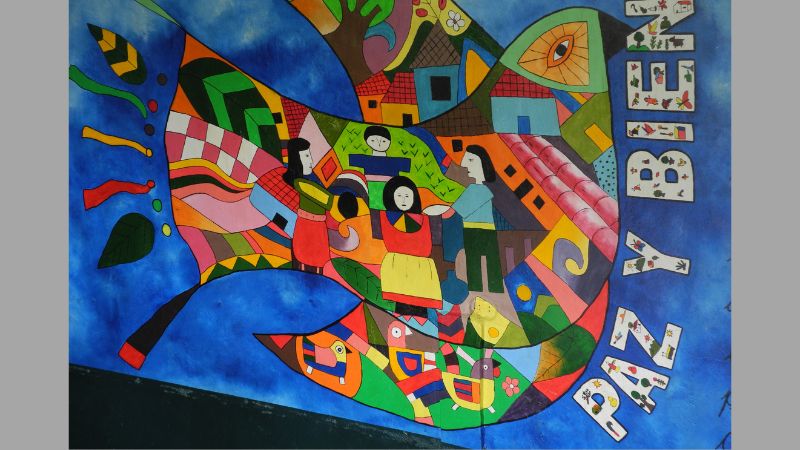Pacem in Terris, 60 years on

On the 60th anniversary of Pope St John XXIII’s papal encyclical Pacem in Terris (Peace on Earth), we reflect on its important messages for our world today.
Pacem in Terris was first published on 11 April 1963, in the midst of the Cold War and with the Vietnam war ongoing. It was two years after the erection of the Berlin Wall and just months after the Cuban Missile Crisis brought the world to the brink of a nuclear third world war.
Written during the first year of Vatican II, it was the first time a major Catholic Social Teaching document was addressed not just to Catholics but to “all people of good will”. In the letter Pope John XXIII proposes that the responsibility to work for peace belongs not just to states and leaders, but to all people who must work together in the increasingly interdependent relationships of the global community.
Read the full text of Pacem in Terris
Human dignity and rights
The richness of the encyclical is striking. Pacem in Terris focuses on describing the political, social and economic conditions that will create peace on earth. It calls us to respect the dignity of people and argues that respect for the human rights of all human beings is the basis for authentic justice and peace.
Stand with human rights defenders today
Written at a time when Nelson Mandela was standing trial for fighting apartheid, five months, before the Rev. Martin Luther King Jr.’s March on Washington and before the Race Relations Acts made racial and ethnic discrimination a civil offence in England, the encyclical emphatically declares that “racial discrimination can in no way be accepted.” (#44)
Peace and justice
“Peace is but an empty word, if it does not rest upon… an order that is founded on truth, built up on justice, nurtured and animated by charity, and brought into effect under the auspices of freedom.”
#167
Pope John XXIII proposes a social and political order in the service of the common good. Peace is more than the absence of war; there can be no talk of peace without liberty and development. It is won by establishing justice. As the encyclical challenges “it is useless to admit that people have a right to the necessities of life, unless we also do all in our power to supply them with means sufficient for their livelihood” (#31). In many respects it paved the way for faith-based charities such as CAFOD to promote justice, human rights and peacebuilding.
Pacem in Terris also speaks directly to the issue of disarmament, calling for an end to the arms race, a ban on nuclear weapons and a disarmament program. A “true and lasting peace among nations cannot consist in the possession of an equal supply of armaments” states Pope John XXIII “but only in mutual trust.”
Blessed are the peacemakers
Pope Francis has spoken of the “third world war” being fought piecemeal. At the beginning of the year in his address to international diplomats to the Holy See, he said “today the third world war is taking place in a globalized world where conflicts involve only certain areas of the planet directly, but in fact involve them all.” In response to this he urged a recommitment to the fundamental goods outlined by Pacem in Terris: truth, justice, solidarity and freedom
We are clearly still very much in need of the challenging, relevant, and hopeful message of this encyclical. And we can be inspired by those who live out its message today.
With an internal armed conflict lasting over 50 years, many Colombians know violence at first hand. The peace agreement signed by the Colombian government and the Revolutionary Armed Forces (FARC) guerrilla group in 2016 was a historic step, but the conflict continues, as there are other armed actors.
Blanca, a social work and communications expert, who works for a better future in Magdalena Medio in Colombia, speaks of what peace means to her. Much in what she says resonates with the themes of Pacem in Terris
“For me peace means tranquillity and wellbeing. It means sharing as a community, sharing as a family, having spaces where opinions can be expressed…Peace means we can all have the same opportunities, that we can all access education, health, welfare without distinguishing between religion, race or economic class.”
Blanca
Find out more about our partners’ work in Magdalena Medio in our video celebrating building peace.
A “confident hope”
Pope John XXIII truly believed that peace is possible in our broken world. His was a “confident hope.” (#167) On this 60th anniversary of the encyclical let’s renew our hope for a better world and commit ourselves once more to working for peace and justice for this is “a requirement of Love. Every believer in this world of ours must be a spark of light, a centre of love…” (#164)